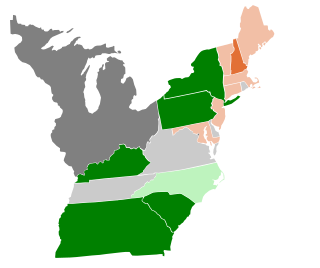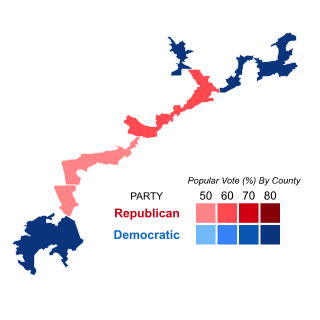A special election was held in North Carolina's 8th congressional district on August 6, 1801, to fill a vacancy created when David Stone (F) resigned upon being elected to the Senate before the 7th Congress began.
| Elections in North Carolina |
|---|
 |
A special election was held in North Carolina's 8th congressional district on August 6, 1801, to fill a vacancy created when David Stone (F) resigned upon being elected to the Senate before the 7th Congress began.
| Candidate | Party | Votes [1] | Percent |
|---|---|---|---|
| Charles Johnson | Democratic-Republican | 2,160 | 53.2% |
| Thomas Wynns | Democratic-Republican | 1,903 | 46.8% |
| Thomas Johnston | Democratic-Republican | 1 | 0.03% |
Johnson took his seat on December 7, 1801, at the start of the 7th Congress. He subsequently died on July 23, 1802, [2] creating a second vacancy which was filled in another special election.

The 1800–01 United States Senate elections were held on various dates in various states, coinciding with Thomas Jefferson being elected to the White House. As these U.S. Senate elections were prior to the ratification of the Seventeenth Amendment in 1913, senators were chosen by state legislatures. Senators were elected over a wide range of time throughout 1800 and 1801, and a seat may have been filled months late or remained vacant due to legislative deadlock. In these elections, terms were up for the senators in Class 3.

The 1800 United States House of Representatives elections in New York were held from April 29 to May 1, 1800, to elect ten U.S. Representatives to represent the State of New York in the United States House of Representatives of the 7th United States Congress.

The 1802 United States House of Representatives elections in New York were held from April 27 to 29, 1802, to elect 17 U.S. Representatives to represent the State of New York in the United States House of Representatives of the 8th United States Congress.

The 1804 United States House of Representatives elections in New York were held from April 24 to 26, 1804, to elect 17 U.S. Representatives to represent the State of New York in the United States House of Representatives of the 9th United States Congress. At the same time, a vacancy was filled in the 8th United States Congress.

The 1808 United States House of Representatives elections in New York were held from April 26 to 28, 1808, to elect 17 U.S. Representatives to represent the State of New York in the United States House of Representatives of the 11th United States Congress. At the same time, a vacancy was filled in the 10th United States Congress.

Elections to the United States House of Representatives were held in Pennsylvania on October 9, 1798, for the 6th Congress.

A special election was held in New York's 6th congressional district October 6–8, 1801 to fill a vacancy left by the resignation of John Bird (F) on July 26, 1801, prior to the first meeting of the 7th Congress.

A special election was held in Pennsylvania's 4th congressional district on October 13, 1801 to fill a vacancy left by the resignation of Peter Muhlenberg (DR) on March 3, 1801, prior to the beginning of the 7th Congress. Muhlenberg had been elected to the Senate.

A special election was held in Pennsylvania's 12th congressional district on October 13, 1801, to fill a vacancy caused by the resignation of Albert Gallatin (DR) in May, 1801, prior to the first meeting of the 7th Congress, after being appointed Secretary of the Treasury.

A special election was held in Maryland's 7th congressional district to fill a vacancy left by the resignation of John Brown (DR) to accept a position as clerk of the county court of Queen Anne's County. Brown had earlier been re-elected to the 12th Congress, thus, his resignation created vacancies in both the 11th and 12th Congresses. Unusually, a single ballot was used for both vacancies. This was the first of at least three examples of this sort of dual-vacancy being filled with one ballot.

On January 1, 1818, a special election was held in North Carolina's 7th district to fill a vacancy left by the death of Representative-elect Alexander McMillan (F) before the 15th Congress had assembled.
A special election was held in Massachusetts's 3rd congressional district on December 15, 1800, to fill a vacancy left by the resignation of Samuel Lyman (F) on November 6, 1800.

A special election was held in Georgia's at-large congressional district on March 23, 1801 to fill a vacancy left by the death of James Jones on January 11, 1801, before the start of the 7th Congress. His death had also left a vacancy in the 6th Congress, which went unfilled.
A special election was held in Maryland's 2nd congressional district on March 2, 1802, to fill a vacancy left by the resignation of Richard Sprigg, Jr. (DR) on December 11, 1801.
A special election was held in Massachusetts's 4th congressional district August 24, 1801 to fill a vacancy caused by the resignation of Levi Lincoln Sr. (DR) on March 5, 1801, before the first session of Congress, upon being appointed U.S. Attorney General.
A special election was held in Massachusetts's 12th congressional district on five occasions between September 25, 1801 and July 29, 1802 to fill a vacancy left by the resignation of Silas Lee (F) on August 20, 1801, prior to the beginning of the 1st Session of the 7th Congress.
A special election was held in Massachusetts's 14th congressional district to fill the vacancy left by George Thatcher (F) declining to serve a 7th term, having served continuously since the 1st Congress and, after the death of Thomas Hartley (F) in Pennsylvania's 8th congressional district on December 21, 1800, the last remaining member of the 1st Congress to have continuously served in the House. The election was held on June 22, 1801

A special election was held in North Carolina's 8th congressional district on October 15, 1802 to fill a vacancy left by the death of Charles Johnson (DR) on July 23, 1802.
A special election was held in South Carolina's 4th congressional district on April 12–13, 1802 to fill a vacancy resulting from the resignation of Thomas Sumter (DR) on December 15, 1801, upon being elected to the Senate.

A special election for the United States House of Representatives in North Carolina's 12th congressional district was held on November 4, 2014, to fill the vacancy caused by the resignation of U.S. Rep. Mel Watt following his appointment to head the Federal Housing Administration.